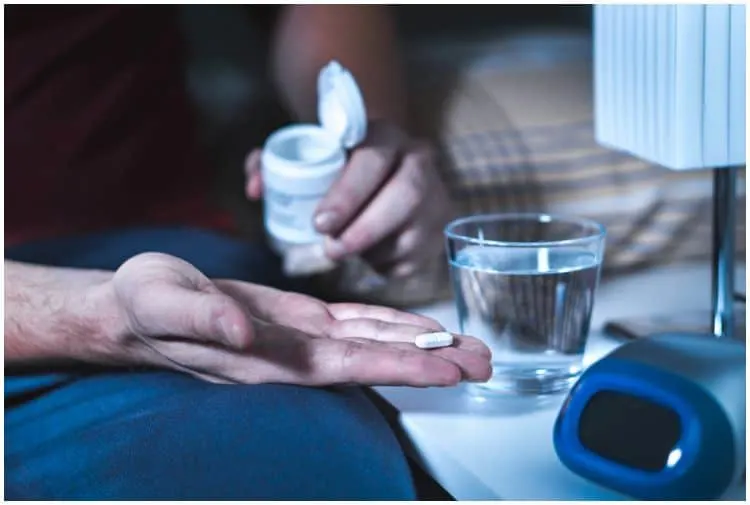Comparison Zzzquil vs Benadryl:
Introduction
Insomnia is a sleep disorder that is described by poor sleep quality.
An estimated 40 percent of the population experiences signs of insomnia every year, according to the National Center for Sleep Disorders Research.
Causes
The most common causes of sleep problems are:
- shift work;
- depression;
- jet lag;
- anxiety;
- the use of recreational drugs, such as – ecstasy or cocaine;
- tobacco smoke;
- stress;
- caffeine intake (found in chocolate, coffee, energy drinks, weight loss supplements, green tea, and some medications);
- noise;
- a regular consumption of alcohol;
- uncomfortable beds;
- a room that’s too hot or cold.
Symptoms
Aside from the common sleep problems, many individuals with insomnia report problems like:
- difficulty concentrating;
- feeling as if sleep was non-restorative;
- general lack of energy;
- depression;
- daytime sleepiness;
- decreased quality of life;
- behavior disturbances, like impulsive behaviors;
- having accidents while driving fatigued;
- waking up earlier than planned and feeling tired;
- troubles in professional and personal relationships;
- a decreased performance at work;
- forgetfulness.
Treatment
Treatment for sleep problems may involve psychotherapy, lifestyle changes (like – developing better sleep habits and reducing the intake of alcohol or tobacco), and sometimes medications.
Here is a comparison of 2 over-the-counter medicines that are used to combat insomnia:
ZzzQuil
It is an OTC sleep aid that is produced by Vicks, an American company that is part of Procter & Gamble Co.
The active ingredient in this product is diphenhydramine, an antihistamine drug.
ZzzQuil’s inactive ingredients:
- sorbitol sorbitan solution;
- purified water;
- polyethylene glycol;
- pharmaceutical ink;
- glycerin;
- gelatin;
- FD&C Red No. 40;
- FD&C Blue No. 1.
Also, it contains alcohol, approximately 10 percent – which is not good for people who are looking to stay away from this substance.
Benadryl
It is an over-the-counter product that contains diphenhydramine, a drug that belongs to a family of drugs known as antihistamines. It was discovered in 1946.
Diphenhydramine has antivertigo, antiemetic, anticholinergic, antidyskinetic, sedative, and local anesthetic attributes.
Inactive ingredients:
- talc;
- titanium dioxide;
- stearic acid;
- starch;
- pregelatinized starch;
- providone;
- polyethylene glycol;
- microcrystalline cellulose;
- hypromellose;
- crospovidone;
- colloidal silicone dioxide;
- candelilla wax.
Uses
ZzzQuil is indicated for the relief of occasional sleeplessness.
Benadryl is used to relieve symptoms and signs of hay fever, allergy (a reaction of your immune system), and the common cold. These symptoms and signs include:
- sneezing;
- an itchy and runny nose;
- cough;
- itchy eyes;
- watery eyes;
- rash.
Also, this product can be used for motion sickness and Parkinson’s disease as well as a sleep aid.
Mechanism of Action
Diphenhydramine works by blocking histamine – a neurotransmitter that the body makes during an allergic reaction.
This drug also causes drowsiness and can be used by people who occasionally have trouble sleeping.
It is rapidly absorbed when administered orally with a duration of effect which lasts from 3 to 6 hours.
The effects of the drug can last up to 9 hours in people with liver disease.
Side Effects
ZzzQuil
The most common adverse events associated with this antihistamine include:
- day-time drowsiness after night-time use;
- loss of coordination;
- blurred vision;
- drowsiness;
- dry eyes;
- dizziness;
- upset stomach;
- constipation;
- dry nose, mouth, or throat.
Call your healthcare provider if you have a serious side effect like:
- uncontrollable movements of the tongue;
- fluttering in the chest;
- tightness in the jaw or neck;
- pounding heartbeats;
- feeling like you might pass out;
- painful urination;
- confusion;
- little or no urinating.
Benadryl
Common side effects of this over-the-counter medicine include:
- dry mouth;
- vomiting;
- blurred vision;
- stomach upset;
- drowsiness.
Serious side effects may include:
- anxiety;
- nausea;
- constipation;
- rapid heart rate;
- painful urination;
- difficulty urinating.
Dosage
ZzzQuil should be taken once a day before bedtime. Do not take more than one dose in a 24 hour period.
Benadryl comes in a capsule, tablet, and oral solution. For relieving the symptoms of hay fever and allergy, the usual recommended dose is 1 to 2 capsules or tablets every 4 to 6 hours. For sleep, take 1 capsule or tablet.
Note – an overdose of this medication can cause anticholinergic, central nervous system, and cardiovascular effects.
Warnings & Precautions
ZzzQuil
It is not intended for use in children under 12 years old.
Also, it shouldn’t be used for insomnia lasting more than 14 days.
Before using this OTC sleep medicine, tell your healthcare provider if you have:
- prostate enlargement;
- glaucoma;
- obstruction of the bladder or bowel;
- hyperthyroidism;
- peptic ulcer disease;
- heart disease;
- pneumonia;
- high blood pressure (hypertension);
- chronic obstructive pulmonary disease;
- asthma.
Benadryl
Excessive use of anticholinergic drugs, like diphenhydramine, may cause an increased risk of dementia (the loss of cognitive functioning — remembering, thinking, and reasoning) in many users, according to a JAMA Internal Medicine study.
ALSO READ: Butenafine Hydrochloride vs Clotrimazole
Drug Interactions
ZzzQuil
It may interact in a negative way with the following drugs:
- Lyrica (pregabalin);
- Ambien (zolpidem);
- Vicodin (acetaminophen/hydrocodone);
- BuSpar (buspirone);
- Zoloft (sertraline);
- cetirizine (a potent second-generation antihistamine);
- Zyrtec (cetirizine);
- Cymbalta (duloxetine);
- Xanax (alprazolam);
- Dextromethorphan;
- Tramadol (an opioid pain medication);
- hydrocodone (a semi-synthetic opioid synthesized from codeine);
- Norco (acetaminophen/hydrocodone);
- Lexapro (escitalopram).
Benadryl
It may interact in a negative way with the following medications:
- trazodone;
- clonazepam (a medication used to treat seizures and panic disorder);
- Zyrtec (cetirizine);
- Cymbalta (duloxetine);
- Zoloft (sertraline);
- gabapentin (a medication used to treat nerve damage and seizure disorders from shingles);
- Xanax (alprazolam);
- tramadol;
- hydrocodone;
- Mucinex DM (dextromethorphan/guaifenesin);
- lisinopril.
ALSO READ: Citrucel vs Metamucil
Alcohol

@Getty
It is not advisable to drink alcohol while taking these medicines since alcohol intake can significantly heighten the sleep-inducing effects of the active ingredient in these OTC products.
Is It Safe During Pregnancy or Breastfeeding?
ZzzQuil
There isn’t enough information about the safety of using this over-the-counter medicine during pregnancy and breastfeeding.
Consult with your healthcare provider to weigh the potential risks and benefits before using this sleep aid medicine.
Benadryl
Avoid this medicine if you are breastfeeding an infant since it can pass through breast milk to the infant.
This medicine is considered safe to use during pregnancy, still, consult with your healthcare professional before taking it.
ALSO READ: Clotrimazole vs Miconazole
Conclusion: Zzzquil vs Benadryl – Which Is The Best OTC Sleeping Pill?
ZzzQuil Nighttime Sleep-Aid is an over-the-counter medicine that can help relieve occasional sleep problems.
Benadryl is the brand name given to the drug diphenhydramine, which is most commonly used by people suffering from allergy symptoms, like – itchy eyes, runny nose, and a sore throat.
In conclusion, both products have as the active ingredient a drug called diphenhydramine, but they have different inactive ingredients.
Another difference is that ZzzQuil Nighttime Sleep-Aid is marketed for sleep problems, while Benadryl can cause drowsiness as a side effect.
Both medicines are anticholinergic drugs that block the action of a neurotransmitter which has an essential role in waking us up, called acetylcholine. More importantly, diphenhydramine has been proven to reduce REM cycles.
REM sleep is vital since it is the restorative part of our sleep cycle.
Sources https://www.sciencedirect.com/pharmacology-toxicology-and-pharmaceutica https://jamanetwork.com/journals/jamainternalmedicine/

